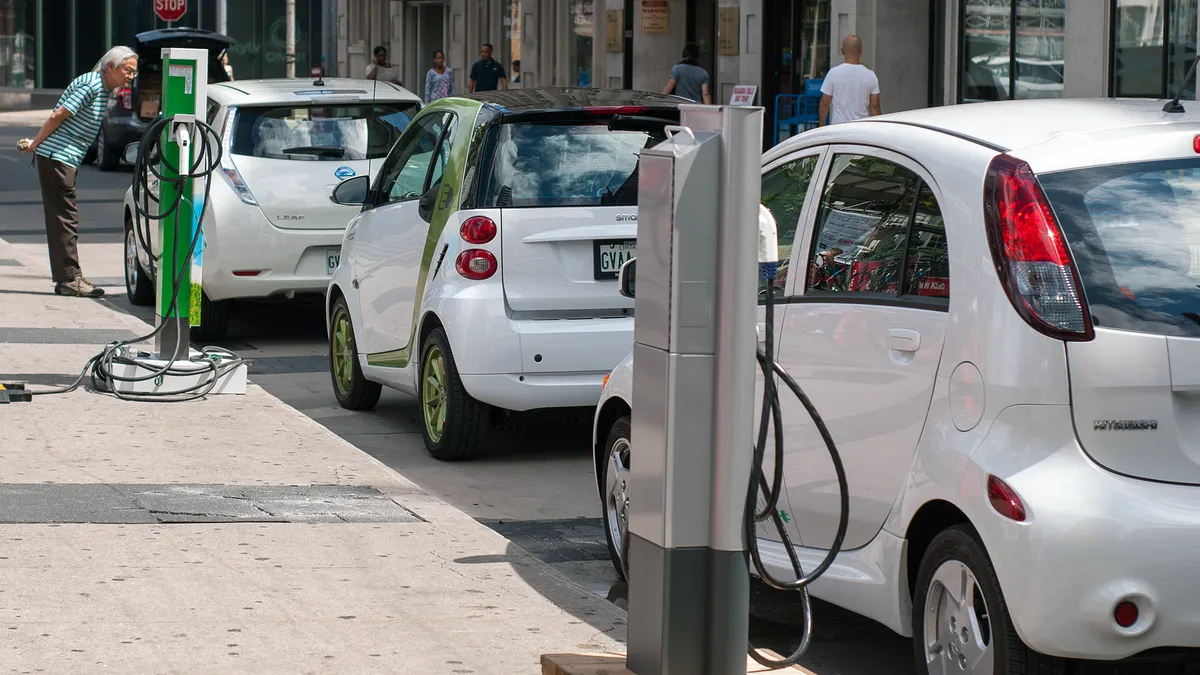GRAND RAPIDS, MICH. — Utility companies clashed with oil industry interests over electric vehicle and fuel subsidies at a meeting of the American Legislative Exchange Council (ALEC), a conservative political group, last Friday.
Oil-backed groups led by the Institute for Energy Research (IER) proposed a resolution that opposed state efforts to subsidize non-gas vehicles and allow utilities to charge customers for — or "ratebase" — EV charging stations. It was tabled after a protracted floor battle and opposition from utility interests like Duke Energy and the Edison Electric Institute, a trade group.
The battle at ALEC, a secretive group that convenes private companies and conservative legislators, shows how utility interests are diverging from those of the oil and gas sector in an era of low-priced renewable energy and proliferating electric vehicles. Supporters of the resolution say they intend to bring it back up in November at ALEC's annual meeting in New Orleans.
"What we need to do is figure a [way to] work around the corporate rent seekers," said Myron Ebell, energy director at the Competitive Enterprise Institute, a conservative think tank that supported the resolution. "Groups like UPS and some of the utilities like Duke Energy and the Edison Electric Institute, we need to figure out a way to work around them."
The AFV resolution
The Alternative Fuel Vehicle (AFV) resolution began as a proposal for consideration at ALEC's Spring Policy Summit in the Western Michigan city of Grand Rapids last week.
ALEC, formed in 1973, serves as a private policymaking body for major companies and conservative lawmakers. Corporate members, who pay tens of thousands of dollars in annual dues, convene with lawmakers to craft model policies that legislators then bring back to their states to enact.
The group is influential — Brookings reported in 2013 that the rate of adoption for ALEC model legislation is "strikingly high" compared to other bills.
The AVF resolution originally targeted subsidies for non-gas vehicles, including "electric, natural gas, biofuel, propane clean diesel and, in some instances, supporting fueling infrastructure." It was introduced in two separate committees, or "task forces," by IER, an energy group funded by the oil magnate Koch brothers, as well as Ebell's CEI and conservative group Americans for Prosperity.
ALEC meetings are private events not open to the press, so Utility Dive was not present for task force votes. But multiple sources inside each room provided information on how the resolution evolved and was eventually defeated.
Facing a close vote in the energy task force, a state legislator from Texas introduced an amendment on the floor that expanded the resolution's scope to any energy subsidies. Another amendment from an Ohio lawmaker sought to broaden it further, including all energy mandates as well as subsidies.
"The resolution originally was really just for electric vehicles and related infrastructure on subsidies," said Rep. Ron Simmons (R-Texas), who introduced one of the amendments. "I agreed with it, would have voted for it, but also we don't really need subsidies in the energy world at all."
Opponents of the resolution expected the Simmons amendment to be a poison pill, as it would include renewable fuel subsidies and oil industry tax breaks important to many ALEC legislators. But despite that and opposition from utilities, the amended resolution narrowly passed the energy task force.
"The resolution as it passed it would apply not only to all vehicle types but it would also apply to subsidies and mandates of all fuel types, so that would include, for example, the renewable fuel standard," Ebell, who chaired President Trump's EPA transition team, said. "EEI was lobbying against it and so was Duke Energy."
Duke did not respond to requests for comment on ALEC, but EEI confirmed it worked against the resolution.
"The Edison Electric Institute strongly opposed this resolution, and we are extremely disappointed in these efforts to limit our ability to serve our customers," said spokesperson Brian Reil. "As the operators of the energy grid, electric companies play an important role in developing charging infrastructure and expanding access to electric transportation for our customers and the communities we serve."
Despite support in the energy committee, the resolution hit stronger opposition in the commerce task force, where participants say some legislators got cold feet about opposing all forms of fuel subsidies.
"Their main concern, which I shared, is that the resolution could have been more carefully worded," said Rep. Bill Seitz (R-Ohio), who sits on the ALEC Board of Directors. "I don't oppose, nor do I think most of the people in the room oppose, traditional forms of government incentives for not just alternative fuels, but also alternative forms of energy."
Seitz said he would have preferred language that opposed only policies that "compel customers to subsidize" certain forms of energy. Ohio is trying to lure a multi-billion dollar ethane cracker plant to the state, he said, and "there is no way in hell we're going to be able to land that project without appreciable assistance from the state."
"If it's something as simple as building them better roads or more likely job tax credits or other forms of assistance they provide I see nothing wrong with that," Seitz said, "but where I fault the resolution is in failing to make clear that we are not opposing that."
Seitz is known in clean energy circles for his consistent opposition to renewable portfolio standards in Ohio. But the Majority Leader of the Ohio House told Utility Dive he is against "mandates, not subsidies," and has opposed similarly broad efforts at ALEC in the past — including resolutions pushed by EEI against Property Assessed Clean Energy (PACE) financing for energy efficiency upgrades.
"[PACE] is a program of financing undertaken by ... those that are willing to do energy efficiency and are willing to have their property assessed to provide a financing vehicle to make it a smoother payout," he said. "Why should we oppose that? We should not, yet twice in the last year we've had to beat down resolutions in that same task force that were intended to oppose PACE financing in all its forms."
EEI did not respond to a request for comment on its involvement with PACE resolutions.
A Big Easy battle?
Seitz’s opposition to the AFV resolution may make its revival at the New Orleans meeting less likely, as the ALEC board has the final say over resolutions and model legislation passed out of task forces. An AFV resolution similar to the original proposal was passed in 2015, Ebell said, but was withdrawn by its legislative sponsor before reaching the board.
A key issue in the intervening months is likely to be how the ALEC members view rate-based investments from utilities in EV charging infrastructure. Utilities say the practice is no different than deploying other power infrastructure like poles and wires, but Seitz worries it will block independent companies from entering the space.
"They are in effect compelling ratepayers to subsidize one particular player in this field to the arguable exclusion or disadvantage of others who may wish to play in that space," he said.
Along with EV charging, Ebell said the inclusion of ethanol subsidies in the amended resolution could spell trouble for the effort if it is brought up again in New Orleans.
"The big thing [the amendments] brought in was the renewable fuel standard," he said. "That was not discussed so I'm not sure how aware everyone who voted for it was of that."
Despite the divides, Simmons remained hopeful that ALEC members would endorse the organization's "free market" mission with a broad statement against energy subsidies.
"I was disappointed in my fellow public members who voted to table it because I don't think they would have voted if I made a resolution to add more subsidies," Simmons said. "But it's okay — sometimes people just need a little while to digest it. So the discussion was really, really good and hopefully we'll bring it up in November and get it done."
Correction: An earlier version of this article stated the 2015 alternative fuel vehicle resolution was defeated by the ALEC board. It was withdrawn before board consideration.






















